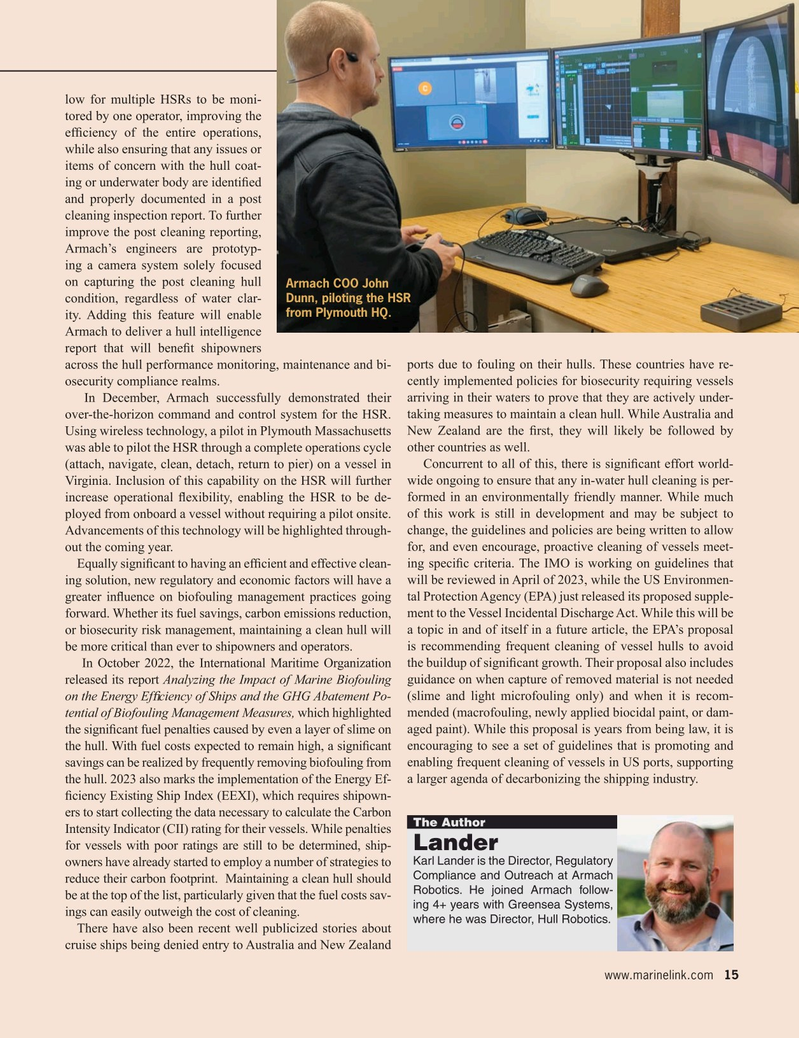
Page 15: of Maritime Reporter Magazine (February 2023)
Government Shipbuilding
Read this page in Pdf, Flash or Html5 edition of February 2023 Maritime Reporter Magazine
low for multiple HSRs to be moni- tored by one operator, improving the ef? ciency of the entire operations, while also ensuring that any issues or items of concern with the hull coat- ing or underwater body are identi? ed and properly documented in a post cleaning inspection report. To further improve the post cleaning reporting,
Armach’s engineers are prototyp- ing a camera system solely focused on capturing the post cleaning hull
Armach COO John
Dunn, piloting the HSR condition, regardless of water clar- from Plymouth HQ.
ity. Adding this feature will enable
Armach to deliver a hull intelligence report that will bene? t shipowners across the hull performance monitoring, maintenance and bi- ports due to fouling on their hulls. These countries have re- osecurity compliance realms. cently implemented policies for biosecurity requiring vessels In December, Armach successfully demonstrated their arriving in their waters to prove that they are actively under- over-the-horizon command and control system for the HSR. taking measures to maintain a clean hull. While Australia and
Using wireless technology, a pilot in Plymouth Massachusetts New Zealand are the ? rst, they will likely be followed by was able to pilot the HSR through a complete operations cycle other countries as well.
(attach, navigate, clean, detach, return to pier) on a vessel in Concurrent to all of this, there is signi? cant effort world-
Virginia. Inclusion of this capability on the HSR will further wide ongoing to ensure that any in-water hull cleaning is per- increase operational ? exibility, enabling the HSR to be de- formed in an environmentally friendly manner. While much ployed from onboard a vessel without requiring a pilot onsite. of this work is still in development and may be subject to
Advancements of this technology will be highlighted through- change, the guidelines and policies are being written to allow out the coming year. for, and even encourage, proactive cleaning of vessels meet-
Equally signi? cant to having an ef? cient and effective clean- ing speci? c criteria. The IMO is working on guidelines that ing solution, new regulatory and economic factors will have a will be reviewed in April of 2023, while the US Environmen- greater in? uence on biofouling management practices going tal Protection Agency (EPA) just released its proposed supple- forward. Whether its fuel savings, carbon emissions reduction, ment to the Vessel Incidental Discharge Act. While this will be or biosecurity risk management, maintaining a clean hull will a topic in and of itself in a future article, the EPA’s proposal be more critical than ever to shipowners and operators. is recommending frequent cleaning of vessel hulls to avoid In October 2022, the International Maritime Organization the buildup of signi? cant growth. Their proposal also includes released its report Analyzing the Impact of Marine Biofouling guidance on when capture of removed material is not needed on the Energy Ef? ciency of Ships and the GHG Abatement Po- (slime and light microfouling only) and when it is recom- tential of Biofouling Management Measures, which highlighted mended (macrofouling, newly applied biocidal paint, or dam- the signi? cant fuel penalties caused by even a layer of slime on aged paint). While this proposal is years from being law, it is the hull. With fuel costs expected to remain high, a signi? cant encouraging to see a set of guidelines that is promoting and savings can be realized by frequently removing biofouling from enabling frequent cleaning of vessels in US ports, supporting the hull. 2023 also marks the implementation of the Energy Ef- a larger agenda of decarbonizing the shipping industry. ? ciency Existing Ship Index (EEXI), which requires shipown- ers to start collecting the data necessary to calculate the Carbon
The Author
Intensity Indicator (CII) rating for their vessels. While penalties for vessels with poor ratings are still to be determined, ship-
Lander
Karl Lander is the Director, Regulatory owners have already started to employ a number of strategies to
Compliance and Outreach at Armach reduce their carbon footprint. Maintaining a clean hull should
Robotics. He joined Armach follow- be at the top of the list, particularly given that the fuel costs sav- ing 4+ years with Greensea Systems, ings can easily outweigh the cost of cleaning. where he was Director, Hull Robotics.
There have also been recent well publicized stories about cruise ships being denied entry to Australia and New Zealand www.marinelink.com 15
MR #2 (1-17).indd 15 2/2/2023 12:26:33 PM

 14
14

 16
16
